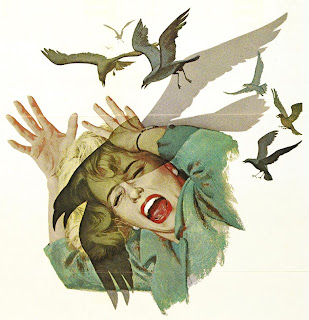The Birds
In a recent article on his favourite Hitchcock film Geoff
Dyer implies that the thing that let’s The Birds down is the birds themselves.
I guess what he might mean is that their awkwardness in terms of special
effects gets in the way of their metaphorical presence. For me the “special”
effects are precisely what imbue them with a very real sense of the uncanny.
The birds is one of those films I thought I had seen because it’s on so many
clip shows and was completely unprepared for its unfiltered delights. I am so
glad I recently watched this film having only the merest whiff of Zizek’s
"mother love" thesis to affect my perception. I soon forgot Zizek’s
interpretation (although I am a fan) and sat exclaiming in wordless wonder all the way through. I
couldn’t believe that such a piece of total art had been produced in the name
of entertainment. With this in mind the special effects seemed to my now
expanding mind to be mind-blowing. Yes there are moments of clunkiness but
these add to the visceral thrill of the merging of rational consciousness with
a freakishly airborne subterranean psyche that I saw occurring on the screen.
“If you find it implausible well there are always novels,” said David Thomson
of Vertigo. He could have added “Or films by James Cameron”. I’m not sure if Hitchcock
would have gone back and CGI’d the birds a la Lucas but as they are they have the invention
of a painter in his prime. It is a lesson in making the most of limited means – and I mean
stretching it to the limit. There are real moments of transcendence in the
effects where they seem to defy science. I’m sure that a neuroscientist could
explain this perception by dint of my predisposed sympathetic stance meaning I filtered
out the artifice but it is precisely this flashing between fake and real that
makes the special effects so riveting. Boy for such an entertaining filmmaker
Hitchcock sure does reveal his process.
The Birds is
not a verbalist movie. That is it is not a linear rational cohesion of “ideas”.
What it does is trigger something in the viewer. My mind wandered to the
explosion in Fifties America of the utopian dream that was now available to
everyone. Tippi Hedren’s character comes from the newly emerged globe trotting media set (her
father owns a newspaper) and has neglected her primal self instead seeking the
glamour of celebrity. Were she around today she would no doubt have had a
well-followed twitter account (pun painfully engineered). She is a sophisticate
and inthral to the electronic tools that are beginning to shape us and our
identities. In this sense she is harbinger the demonic avian intelligence.
Bodega Bay is already apart from the advanced civilisation an hour away down
the road but by the end of the film is completely cut off. What is it with
movies and severed telephone lines? There was no doubt in my mind that the
birds were a manifestation of our neglected subconscious realm. I’m not
referring to suppressed desire in a Freudian yawn inducing sense but rather the
underworld of Orpheus where ambiguity has free reign. In Jungian terms Hedrin
has neglected her shadow self whom she then meets in her humble creative
environs surrounded by books on the hill out of the village. Annie Hayworth is
a brunette making her shadow role almost painfully explicit but its still
delicious.
Ultimately though the film seems to have a moral tone there is no no moral message underpinning it but instead it manifests the need
to explore our whole selves lest the demons be forced out through the side.
This is kind of summed up by the frantic ultimately futile efforts of Rod “Time
Machine” Taylor to seal the house to all possible external threats. He is a
reasoned and stoic figure and at the end of the film Hitchcock archly has him manfully scramble the females
into the car to head back in the direction of civilisation where dark clouds
fill the skies. Will their new acquaintance with their shadow selves equip them
with the skills to survive the coming media vortex I asked myself?

Comments
Post a Comment